Play (1993)
by Tom Stoppard
Directed by Lee Mikeska Gardner
The Nora Theatre Company
Central Square Theater
Central Square, Cambridge, MA
March 31 – May 1, 2016
Scenic Design: Janie E. Howland; Lighting Design: John R. Malinowski; Costume Design: Leslie Held; Sound Designer: Nathan Leigh; Props Advisor/ Senior Dramaturg: Joe Stallone; Director of Voice, Speech and Text: Olivia D’Ambrosio; Animal Wrangler: Maxine Burreta
With Kira Patterson (Thomasina Coverly), Will Madden (Septimus Hodge), Elbert Joseph (Jellaby), Alexander Platt (Exra Chater), Harsh J. Gagoomal (Richard Noakes), Sarah Oakes Muirhead (Lady Croom), Jesse Garlick (Captain Brice), Celeste Oliva (Hannah Jarvis), Jade Wheeler (Choloe Coverly), Ross MacDonald (Bernard Nightingale), Matthew Zahnziner (Valentine Coverly), Max Jackson (Gus/Augustus Coverly), Tank the Turtle (Lightning/Plautus)
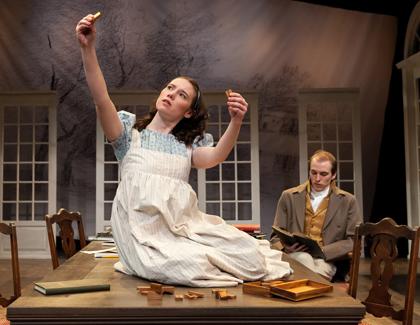
Will Madden as Septimus
in “Arcadia”
Photo: A.R. Sinclair Photography
Courtesy of Central Square Theater
Bringing together almost all of Stoppard’s tricks into one bag, Arcadia is both delightful and overwhelming. It is surprisingly long, but also carried along by periods of scintillating wit and delightful repartee.
There is more intellectual banter than plot, but what there is of plot centers around events that occur at the beginning of the nineteenth century that are probed and unraveled by several scholars working in the late twentieth century. Romance and the threat of romance linger in both settings, as does the ample and frequent display of invention, poetry, and speculative projection that, throughout the arc of the play, raise the antics to a level of intrigue and inspired vision.
The particular strength of this production – and it’s a significant one – is its style of emphasis on the character of the young woman, Thomasina Coverly (Kira Patterson), who generates a turbine full of emotional and intellectual power in the early nineteenth century portion of the play.
Her character, in many ways, is the most fascinating overall, and director Lee Mikeska Gardner has wisely chosen to point a strong light on her story as a way of cohering the whole. While barbs are flying across the stage and the centuries, this tale of an inspired and intellectually talented young woman creates a core that holds one firmly to the end.
In that role, Kira Patterson does a particularly brilliant job of conveying its complex dimensions – a relentless imaginative inventiveness that boils over along with all the passions of young womanhood. Patterson’s Thomasina is like a coiled spring, full of exuberance and naivete, naturalness and savoir-faire, a youthful sense of possibility along with the shadows of destiny.
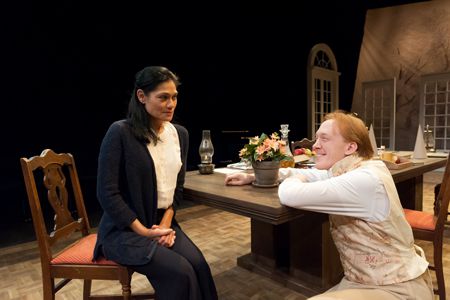
Matthew Zahnziner as Valentine
in “Arcadia”
Photo: A.R. Sinclair Photography
Courtesy of Central Square Theater
Along the way, the play is full of all sorts of Stoppardian tricks and themes.
The mystery story – the attempt by modern-day researchers Hannah Jarvis (Celeste Oliva) and Bernard Nightingale (Ross MacDonald) to uncover the facts of the tale that Stoppard outlines in the nineteenth century part – echoes with the cute and intricate sleuthing Stoppard shows in his early wit-fest The Real Inspector Hound (1962).
The intellectual-existential face-off, demonstrated most vividly here in the complex relationship between Hannah and Bernard, takes its cues right out of what is perhaps Stoppard’s masterpiece, The Real Thing (1982).
And the interpolation of history and the search for uncertainties within it smacks of the sort of attempt Stoppard makes in Travesties (1974) to reconstruct the Zurich in which James Joyce, Lenin, and Dadaist Tristan Tzara crossed paths in the early twentieth century.
The dramatic frame provided for Thomasina’s story is beautifully shaped by Will Madden as Septimus Hodge, her tutor and more, who provides a wonderfully offhand while passionate and dashing counterpart. Alexander Platt as the hilariously priggish Ezra Chater and Sarah Oakes Muirhead as the lusty Lady Croom, Thomasina’s mother, also fill out the historical refuge spicily.
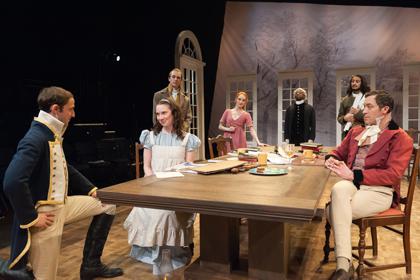
Photo: A.R. Sinclair Photography
Courtesy of Central Square Theater
In the modern context, probing and plundering the historic tale provide the engine of the drama and Celeste Oliva as Hannah faces off powerfully against Ross MacDonald as the amusingly hypertensive Nightingale, with mutuality effectively conveying a sense of the impassioned engagement that underlies the competitive revulsion between them.
Matthew Zahnzinger as Valentine Coverly, Hannah’s less complex potential consort, provides a dignity and restraint that is noteworthy in its elegance and charm. His Valentine is also eloquent and concise as the eventual discoverer of Thomasina’s hidden genius.
While brilliantly suggestive overall, and very funny in many spots, Arcadia has so much going on in it and is so laden with intellectual and academic implications, that it is often difficult to keep track of the many interlaced themes. Sometimes that provides a kind of glittering appeal, but at others it just seems overwhelming.
Determinism and Newtonian physics get challenged by Thomasina’s inventions in the realm of mathematical accounts of entropy and thermodynamics. Fermat’s Last Theorem gets thrown in as an aside. British garden design, whether motivated by structure or naturalness, is woven into the rest of the densely layered fabric. The conflict between academic competitiveness and intellectual integrity burst forth at every turn, and the challenges of love and desire to prevail in a world governed by regulation and pretension surface continually. And the grasp towards life and passion on the cusp of incipient calamity rides through as a tragic undercurrent.
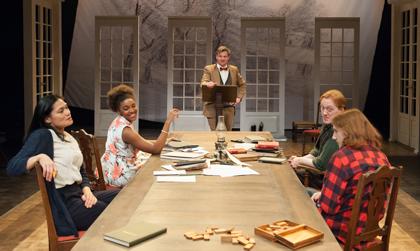
Jade Wheeler as Chloe
Ross MacDonald as Bernard
Matthew Zahnzinger as Valentine
Max Jackson as Gus
in “Arcadia”
Photo: A.R. Sinclair Photography
Courtesy of Central Square Theater
This play, though brilliant and wonderful in so many ways, appeared at that point in Stoppard’s career when he had become so celebrated that a level of editing that might have been useful never got done. That growing tendency became more evident in the later The Coast of Utopia (2002), Stoppard’s trilogy about nineteenth century Russian political philosophers, given a brilliant production at Lincoln Center, but way too long and unwieldy.
The opening of Arcadia, however, exhibits the very best of Stoppard’s writing, and this production carries it off brilliantly well. It is funny, charming, ruthless, and relentlessly witty and the intimacy and sharpness come through beautifully here.
Though the writing of the play gets a bit top-heavy at times as it goes along and does not always remain as scintillating, there are many significant places where it very much is scintillating, and the intelligent emphasis of this production on the Thomasina story gives it a coherence and significance that prevails even when the snappy give and take amid the densely packed series of academic references does not quite come off.
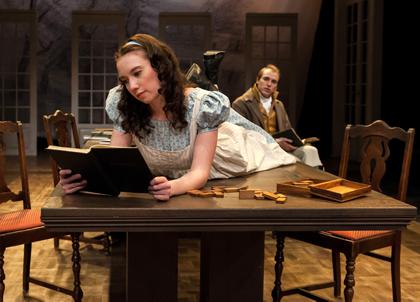
Will Madden as Septimus
in”Arcadia”
Photo: A.R. Sinclair Photography
Courtesy of Central Square Theater
– BADMan
Leave a Reply